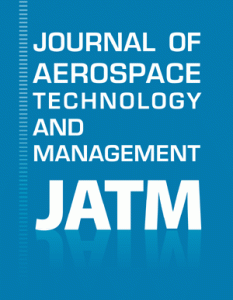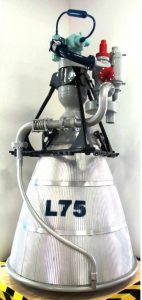By Julliane Silveira, scientific journalist, São José dos Campos, SP, Brazil
The performance of rockets and satellites in space missions depends on their components. One of the most important structures is the engine, whose characteristics influences the speed and distance the rocket can reach and its load capacity.
There are solid propellant engines — extensively studied worldwide – and liquid rocket engines — that are the focus of the latest research on this subject. The Brazilian space program has been aimed at launch vehicles using solid propellants with launch capability limited to a few hundred kilograms into Low Earth Orbit (LEO). To increase the launch envelope and also to improve the launch injection accuracy, rocket engines driven by liquid propulsion are not an option, but a must.
The development of liquid propellant engines is of great importance for the development of the Brazilian aerospace program. Currently, there are some projects for the development of liquid propulsion engines in Brazil. A program for the development of a liquid rocket engine is being carried out at the Brazilian Aeronautics and Space Institute (IAE) in cooperation with the German Aerospace Center (DLR), to be used in the upper stage of the Brazilian launch vehicle.
The idea is to replace the last two solid stages of the VLS-1 launch vehicle by a single liquid rocket stage. The liquid rocket engine, named L75, will be capable of reaching a thrust range of (75 ± 5) kilonewtons, using the propellants combination LOX (liquid oxigen/ethanol. This force could take a 7,5 ton-truck off the ground.
The L75 is an engine for satellite launch vehicles that runs on ethanol and liquid oxygen. In addition to the advantages already mentioned, the use of ethanol brings benefits to health and the environment, as well as giving Brazil the possibility to master the use of an alternative fuel, according to IAE researchers. Ethanol is an easily available fuel in the country, renewable and more affordable than other options.
“The issue of emissions and toxicity is also taken into account today in the development of new engines,” explains Fábio Mota, a researcher at the Federal University of ABC (UFABC) and lead author of the article “Modeling and Analysis of LOX / Ethanol Liquid Rocket Engine”, published in the current issue of the Journal of Aerospace Technology and Management (JATM, vol. 10).
It is estimated that the L75 should enter the qualifying phase between 2022 and 2026 and after that period it will be able to make its first flights. During the simulations and trade-off studies phase, the availability of a versatile tool for this purpose is very useful. For instance, one of the most important and robust tools for vehicle/propulsion analysis was developed when the German Aerospace Center (DLR) and NASA combined computer codes to provide a capability to optimize rocket engines cycles and its parameters, as well as launch vehicles, considering the coupling between them (BURKHARDT, et al., 2002; 2004; SIPPEL, et al., 2003; SIPPEL; YAMASHIRO; CREMASCHI, 2012).
So, specialists aimed to develop a software that allows the evaluation of the performance of L75 – which is described in the article. The work was supported by researchers from UFABC, the National Institute for Space Research (INPE) and the Regensburg Institute of Technology, in Germany.
“The program is intended to be versatile and easily extensible in order to analyze different configurations of liquid rocket engines,” says Mota. The article brings the results of the analysis performed using the L75 performance software under predicted conditions not foreseen in its manufacture.
The software is capable of analyzing multiple configurations of liquid rocket engines. Another purpose of this paper was to present a detailed description of the main components (design equations, main parameters, restrictions, etc.) and the physical laws necessary to balance any power cycle.
References
BURKHARDT, H., et al. Comparative study of kerosene and methane propellant engines for reusable liquid booster stages. In: 4th International Conference on Launcher Technology “Space Launcher Liquid Propulsion”, Liège, 2002.
BURKHARDT, H., et al. Kerosene vs. methane: a propellant tradeoff for reusable liquid booster stages. Journal of Spacecraft and Rockets [online]. 2004, vol. 41, no. 5, pp. 762-769, eISSN: 1533-6794 [viewed 12 December 2018]. DOI: 10.2514/1.2672. Available from: https://arc.aiaa.org/doi/10.2514/1.2672
SIPPEL, M. Studies on expander bleed cycle engines for launchers. In: 39th Joint Propulsion Conference and Exhibit, Huntsville, 2003 [viewed 12 December 2018]. Available from: https://arc.aiaa.org/doi/10.2514/6.2003-4597
SIPPEL, M., YAMASHIRO, R. and CREMASCHI, F. Staged combustion cycle rocket engine design trade-offs for future advanced passenger transport. In: Space Propulsion, Bordeaux, 2012.
To read the article, access it
MOTA, F.A.S., et al. Modeling and Analysis of a LOX/Ethanol Liquid Rocket Engine. J. Aerosp. Technol. Manag. [online]. 2018, vol. 10, e3018, ISSN: 1984-9648 [viewed 12 December 2018]. DOI: 10.5028/jatm.v10.914. Available from: http://ref.scielo.org/tjdx2n
External link
Journal of Aerospace Technology and Management – JATM: <http://www.scielo.br/jatm>
Como citar este post [ISO 690/2010]:




















Recent Comments